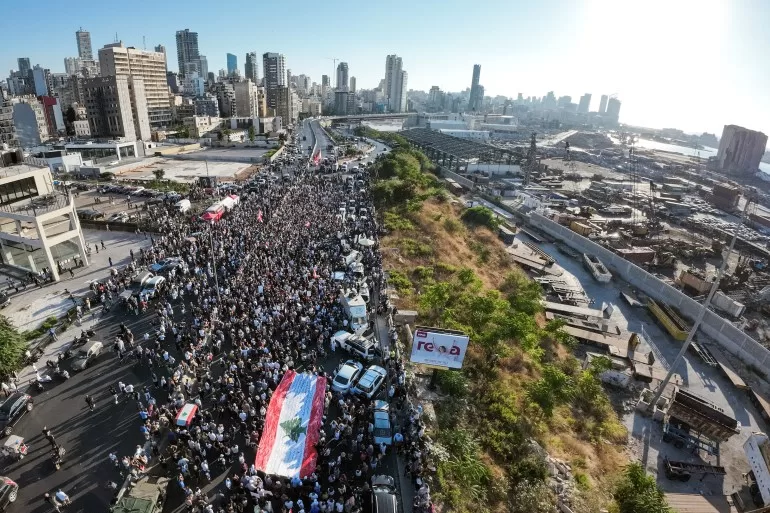No one has been held accountable for the catastrophic explosion that killed more than 220 people.
Protesters are to converge on the Beirut port as Lebanon marks four years since a catastrophic explosion there killed more than 220 people.
Several marches are planned on Sunday to remember the victims of the blast and demand justice as fears of an all-out war between Israel and Hezbollah hang heavy over the grim commemoration.
Nobody has been held accountable for the August 4, 2020, disaster, one of the largest nonnuclear explosions in history. The blast injured at least 6,500 people and devastated large parts of the capital.
Authorities said the explosion was triggered by a fire in a warehouse where a stockpile of ammonium nitrate fertiliser had been haphazardly stored for years.
An investigation has stalled, mired in legal and political wrangling.
“The complete lack of accountability for such a man-made disaster is staggering,” United Nations Special Coordinator for Lebanon Jeanine Hennis-Plasschaert said in a statement on Saturday.
“One would expect the concerned authorities to work tirelessly to lift all barriers, … but the opposite is happening,” she said while calling for “an impartial, thorough, and transparent investigation to deliver truth, justice, and accountability”.
![Demonstrators march outside the port of Beirut on August 4, 2023, to mark the third anniversary of the deadly harbour explosion which devastated large swathes of the Lebanese capital in 2020 [File: Kameel RAYES / AFP]](https://www.aljazeera.com/wp-content/uploads/2024/08/beirut-protest-1722768355.jpg?w=770&resize=770%2C513)
In December 2020, lead investigator Fadi Sawan charged former Prime Minister Hassan Diab and three ex-ministers with negligence, but as political pressure mounted, he was removed from the case.
His successor, Tarek Bitar, unsuccessfully asked lawmakers to lift parliamentary immunity for MPs who were formerly cabinet ministers.
In December 2021, Bitar suspended his investigation after a barrage of lawsuits while the powerful Iran-backed Hezbollah group has accused him of bias and demanded his dismissal.
But in January last year, he resumed investigations, charging eight new suspects, including high-level security officials and Lebanon’s top prosecutor, who in turn charged Bitar with “usurping power” and ordered the release of detainees in the case.
The process has since stalled again.
Activists have called for a UN fact-finding mission into the blast, but Lebanese officials have repeatedly rejected the demand.
Tensions loom over this year’s anniversary after the assassination of Hamas political chief Ismail Haniyeh, which Iran blamed on Israel and the United States.
Haniyeh’s killing in Tehran on Wednesday, hours after the Israeli assassination of Hezbollah military chief Fuad Shukr in Beirut, has triggered pledges of revenge from Iran and the “axis of resistance”, armed groups across the Middle East backed by Iran.
Lebanon’s Hezbollah, an ally of the Palestinian group Hamas, and the Israeli army have been trading cross-border fire since the Israeli assault on Gaza began in October after Hamas led a rare attack inside Israeli territory, killing 1,139 people and taking roughly 200 others captive.
At least 39,583 Palestinians have been killed and more than 91,000 wounded in Israel’s war on the besieged enclave.
On Sunday, several Western governments, including the US, the UK and France, urged their citizens to leave Lebanon immediately due to escalating tensions. Several airlines have suspended flights to the region.
